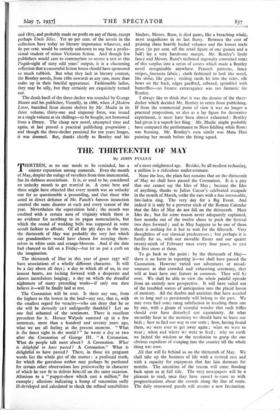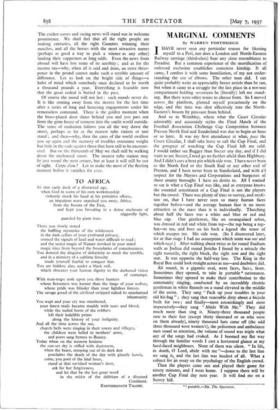THE THIRTEENTH OF MAY
By JOHN PULLEN
THIRTEEN, as no one needs to be reminded, has a sinister reputation among numerals. Even the month of May, despite the eulogy of versifiers from time immemorial, has its dubious associations. It is, or used to be, considered an unlucky month to get married in. A cynic here and there might have objected that every month was an unlucky one for so questionable a proceeding, and that those who acted in direct defiance of Mr. Punch's famous injunction courted the same disaster at each and every season of the year. Nevertheless the superstition held ; the month was credited with a certain aura of virginity which there is no evidence for ascribing to its pagan nomenclatrix, but which the sound of wedding bells was supposed in some occult fashion to affront. Of all the 365 days in the year, the thirteenth of May was probably the very last which our grandmothers would have chosen for arraying them- selves in white satin and orange-blossom. And if the date had chanced to fall on a Friday—but let us put a curb on the imagination.
The thirteenth of May in this year of grace 1937 will have associations of a wholly different character. It will be a day above all days ; a day to which all of us, in our inmost hearts, are locking forward with a desperate and almost incredulous longing; a day on which the dreadful nightmare of many preceding weeks—if only one dare believe it—will be finally laid at rest.
The Coronation will be over. Is there any one, from the highest to the lowest in the land—any one, that is, with the smallest regard for veracity—who can deny that he or she will be devoutly Eni unfeignedly thankful ) Let no one feel ashamed of the sentiment. There is excellent precedent for it. Horace Walpole summed up in a few sentences, more than a hundred and seventy years ago, what we are all feeling at the present moment. "What is the finest sight in the world ? " he wrote a day or two after the Coronation of George III. "A Coronation. What do people talk most about? A Coronation. What is delightful to have passed? A Coronation." What is delightful to have passed ? There, in those six pregnant words lies the whole gist of the matter : a profound truth, for which the garrulous author may perhaps be pardoned for certain other observations less praiseworthy in character of which he saw fit to deliver himself on the same occasion. Allusions to a "puppet-show which cost a million," for example ; allusions indicating a bump of veneration sadly ill-developed and calculated to shock the refined sensibilities of a more enlightened age. Besides, by all modern reckoning, a million is a ridiculous under-estimate.
None the less, the plain fact remains that on the thirteenth of May we shall have passed the Coronation. It is a pity that one cannot say the Ides of May ; because the Ides of anything, thanks to Julius Caesar's celebrated escapade in the month of March, strike the ears with a fine irrevocable, fate-laden ring. The very day for a Big Event. And indeed it is only by a perverse trick of the Roman Calendar that the Ides of May do not fall on the thirteenth. Most Ides do ; but for some reason never adequately explained, four months out of the twelve chose to push the festival two days forward ; and as May happens to be one of them there is nothing for it but to wait for the fifteenth. Very thoughtless of our classical predecessors ; but perhaps it is hardly for us, with our movable Easter and our quaint twenty-ninth of February once every four years, to cast the first stone at them.
To go back to the point : by the thirteenth of May— there is no harm in repeating it—we shall have passed the Coronation. However varied our adventures or misad- ventures at that crowded and exhausting ceremony, they will at least have one feature in common. They will be over. We shall be able to view the whole painful episode from an entirely new perspective. It will have sailed out of the troubled waters of anticipation into the placid haven of memory. All the doubts and anxieties that have assailed us so long and so persistently will belong to the past. We may even find some smug satisfaction in recalling them one by one, with a gleam of scornful wonder that such trifles should ever have disturbed our equanimity. At what unearthly hour in the morning we should have to leave our beds ; how to find our way to our seats ; how, having found them, we were ever to get away again; what we were to wear ; when and where we were to feed ; why on earth we lacked the wisdom or the resolution to grasp the one obvious expedient of escaping into the country till the whole thing was over.
All that will lie behind us on the thirteenth of May. We shall take up the business of life with a revived zest and with a capacity for enjoyment that has lain dormant for months. The amenities of the season will come flooding back upon us at full tide. The very newspapers will be a pleasure to read, once they have ceased to scare us with prognostications about the crowds along the line of route. The daily crossword puzzle will assume a new fascination. The cricket scores and racing news will stand out in welcome prominence. We shall feel that all the right people are making centuries, all the right Counties: winning their matches, and all the horses with the most attractive names (perhaps as good a way to pick a winner as any other) landing their supporters at long odds. Even the news from abroad will have lost some of its acerbity ; and as for the income tax—why, when all is said and done, an extra three- pence in the pound cannot make such a terrible amount of difference. Let us look on the bright side of things—a habit of mind which somebody once declared to be worth a thousand pounds a year. Everything is bearable now that the great ordeal is buried in the past.
Of course the mood will not last : such moods never do. It is like coming away from the dentist for the last time after a series of long and harassing engagements under his remorseless command. There is the golden moment when the brass-plated door slams behind you and you pass out from the grim house of torment into the sunlit world outside. The sense of exaltation follows you all the way down the street, perhaps as far as the nearest tube station or taxi stand ; and then—why, then the cares of the world swallow you up again and the memory of troubles overcome weighs but little in the scale against those that have still to be encount- ered. But on the thirteenth of May we shall still be walking down the enchanted street. The nearest tube station may lie just round the next corner, but at least it will still be out of sight. Carpe diem ! Let us make the most of the fleeting moment before it vanishes for ever.















































 Previous page
Previous page